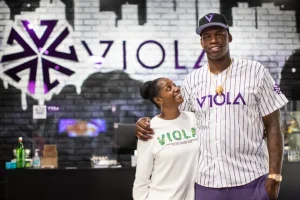Michele Harrington
APRIL JOHNSTON
Michele and Al Harrington haven’t always been the cannabis connoisseurs they are today. A decade ago, Michele was selling real estate in Denver, Colorado, when her husband and NBA star Al learned his grandmother had been diagnosed with glaucoma, a degenerative eye disease that made everyday tasks a struggle. The couple started searching for ways to relieve her pain, and as a last resort, they turned to cannabis.
“Neither Al nor I smoked. You’re always taught to stay away from drugs—you know, that whole era with the War on Drugs. We fell right into that,” Michele Harrington tells Forbes. “We didn’t know much about cannabis, but after talking to people, and because of how free Denver is, we knew that it could provide her with some relief.”
At first, the Harrington matriarch refused to smoke what she called “that reefa,” but as the pain became more intense, she finally agreed to vape it. Before long, the pain was gone and she was quietly reading her Bible, something she hadn’t been able to do for three years.
“It was a life-changing experience for us,” Harrington says. “That’s when we created Viola—and we named it after his grandmother.”
Founded by the Harringtons in 2011, Viola sells premium cannabis products, from butane-extracted concentrates to jars of marijuana called “ultra-premium indoor flower.” Since securing $16 million in funding from New York-based private equity firm Gotham Green Partners in 2019, the company has grown its team to around 70 employees as well as its footprint, setting up shop in two new facilities in Adelanto, California, and Detroit, Michigan. In March, it partnered with Toronto-based biopharmaceutical company Avicanna to bring Viola-branded products to Canada, becoming in the process the first Black-owned multinational cannabis brand, says Al. With thousands of customers across the country, they expect to reach $25 million in revenue this year.
Although they created the company for sentimental reasons, their investment in the marijuana market is just good business. The U.S. cannabis industry is worth $61 billion, and it’s projected to reach $100 billion by 2030.
Empathy Is The Most Important Leadership Skill According To Research
Why U.S. Talent Shortages Are At A 10-Year High
You Probably Need More Friends—Here’s How To Make Them
Still, Harrington says her main goal is increasing representation in the industry. In February of 2020, the couple launched Viola Cares, a nonprofit focused on promoting social justice and increasing representation in the cannabis industry. To that end, they have partnered with Root & Rebound—a group of lawyers and activists working for the communities most affected by mass incarceration and the War on Drugs—and have created a toolkit called A New Leaf: A ‘How-To Guide’ for Successful Reentry After A Cannabis Conviction.
“We believe that cannabis conviction should never be a life sentence. The mission at Viola is one community at a time, one flower at a time,” Harrington says. “We’re in the process of creating 10,000 jobs and hundreds of new business owners, all while expanding the industry’s diversity.”
In October, Michele took another step toward furthering that mission, joining Foria Wellness as its new head of strategic partnerships. Since joining the plant-based CBD company—which sells women’s sexual wellness products ranging from tonics and lubes to bath salts—she’s launched a brand ambassador program and a series of monthly webinars and educational events on Clubhouse in an effort to reach more Black women.
“I felt that Black people and people of color really needed to know about their CBD products—for intimacy, for wellness, for relief—and how these products can make a difference in our daily lives,” Harrington says. I approached [Foria] with my ideas on how to tap into our market, the multicultural market. And Foria loved my pitch so much that they created this position for me.”
The cannabis market is projected to grow 64% in the next decade, but around 600 thousand Black people are arrested each year for marijuana-related offenses and are nearly two times more likely to find themselves behind bars—and more than three times more likely in states that haven’t yet legalized the drug—than white people, according to the ACLU. And when Black entrepreneurs remain grossly underrepresented in the sector—a 2017 survey from the Marijuana Business Daily found that just 4.3% of cannabis business owners were African-American—the Harringtons’ leadership is significant.
They are, however, in good company: Brown Girl Jane cofounders Malaika Jones, Nia Jones and Tai Beauchamp launched their CBD company in January 2020, while Jay-Z, Jaleel White and other celebrities have also ventured into the industry in recent months. Representation, Harrington says, is critical.
“I’m showing my children that it’s not too late to create your path. I want them to see their mother and other Black women pull up their own seats at the table—or create their own table,” Harrington says. “And if I’ve helped alleviate some pain in some way, then I’ve done my job.”
 back
back







